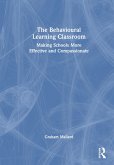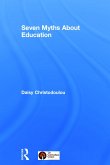Austin Volz, Julia Higdon, William Lidwell
The Elements of Education for Teachers
50 Research-Based Principles Every Educator Should Know
Austin Volz, Julia Higdon, William Lidwell
The Elements of Education for Teachers
50 Research-Based Principles Every Educator Should Know
- Gebundenes Buch
- Merkliste
- Auf die Merkliste
- Bewerten Bewerten
- Teilen
- Produkt teilen
- Produkterinnerung
- Produkterinnerung
Designed for clarity and ease of use, this book is perfect for both new and experienced educators. The authors have surveyed the research literature and carefully curated 50 elements of effective teaching to answer questions and demystify the secrets of master teachers.
Andere Kunden interessierten sich auch für
![The Behavioural Learning Classroom The Behavioural Learning Classroom]() Graham MallardThe Behavioural Learning Classroom149,99 €
Graham MallardThe Behavioural Learning Classroom149,99 €![Assessing Students' Written Work Assessing Students' Written Work]() Catherine HainesAssessing Students' Written Work167,99 €
Catherine HainesAssessing Students' Written Work167,99 €![Responsive Teaching Responsive Teaching]() Harry Fletcher-WoodResponsive Teaching149,99 €
Harry Fletcher-WoodResponsive Teaching149,99 €![Becoming a Growth Mindset School Becoming a Growth Mindset School]() Chris HildrewBecoming a Growth Mindset School148,99 €
Chris HildrewBecoming a Growth Mindset School148,99 €![So... What Does an Outstanding Teacher Do? So... What Does an Outstanding Teacher Do?]() Cat ChowdharySo... What Does an Outstanding Teacher Do?149,99 €
Cat ChowdharySo... What Does an Outstanding Teacher Do?149,99 €![More Urban Myths About Learning and Education More Urban Myths About Learning and Education]() Pedro De BruyckereMore Urban Myths About Learning and Education134,99 €
Pedro De BruyckereMore Urban Myths About Learning and Education134,99 €![Seven Myths About Education Seven Myths About Education]() Daisy ChristodoulouSeven Myths About Education221,99 €
Daisy ChristodoulouSeven Myths About Education221,99 €-
-
-
Designed for clarity and ease of use, this book is perfect for both new and experienced educators. The authors have surveyed the research literature and carefully curated 50 elements of effective teaching to answer questions and demystify the secrets of master teachers.
Produktdetails
- Produktdetails
- Verlag: Routledge
- Seitenzahl: 116
- Erscheinungstermin: 23. April 2019
- Englisch
- Abmessung: 260mm x 183mm x 11mm
- Gewicht: 429g
- ISBN-13: 9781138294639
- ISBN-10: 1138294632
- Artikelnr.: 56894735
- Herstellerkennzeichnung
- Libri GmbH
- Europaallee 1
- 36244 Bad Hersfeld
- gpsr@libri.de
- Verlag: Routledge
- Seitenzahl: 116
- Erscheinungstermin: 23. April 2019
- Englisch
- Abmessung: 260mm x 183mm x 11mm
- Gewicht: 429g
- ISBN-13: 9781138294639
- ISBN-10: 1138294632
- Artikelnr.: 56894735
- Herstellerkennzeichnung
- Libri GmbH
- Europaallee 1
- 36244 Bad Hersfeld
- gpsr@libri.de
Austin Volz is Senior Learner-Experience Designer on the "Tiger Works" Research and Development team at Avenues: The World School. A recipient of both a Fulbright scholarship and Foreign Language and Area Studies Fellowship, Austin holds a bachelor's from St. John's College and a master's from the Harvard Graduate School of Education. Julia Higdon is Senior Research Scientist on the "Tiger Works" Research and Development team at Avenues: The World School. Julia began her career as a teacher and holds a doctorate in education research from the Harvard Graduate School of Education. William Lidwell is Vice President of the "Tiger Works" Research and Development team at Avenues: The World School. He is the author of several books, including the best-selling Universal Principles of Design.
1. 80/20 Rule 2. Ability Grouping 3. Assessment, Formative 4. Assessment,
Self 5. Assessment, Summative 6. Choice Overload 7. Chunking 8. Classroom
Design 9. Classroom Management 10. Creativity 11. Decision Making 12.
Deliberate Practice 13. Depth of Processing 14. Direct Instruction 15.
Discussion-Based Learning 16. Dual Coding 17. Engagement, Parent 18.
Engagement, Student 19. Errors 20. Executive Functions 21. Exercise Effects
22. Expectation Effects 23. Feedback 24. Flexibility Tradeoffs 25. Homework
26. Intelligence 27. Interleaving 28. Metacognition 29. Mnemonic Devices
30. Motivation 31. Peer Tutoring 32. Performance Load 33. Personality 34.
Play 35. Productive Failure 36. Progressive Disclosure 37. Project-Based
Learning 38. Reading Levels 39. Retrieval Practice 40. Scaffolding 41.
Serial Position Effects 42. Sleep Strategies 43. Social-Emotional Learning
44. Spacing 45. Student-Directed Learning 46. Student-Teacher Relationship
47. Study Tactics 48. Teach-to-Learn 49. Technology-Based Instruction 50.
Transfer
Self 5. Assessment, Summative 6. Choice Overload 7. Chunking 8. Classroom
Design 9. Classroom Management 10. Creativity 11. Decision Making 12.
Deliberate Practice 13. Depth of Processing 14. Direct Instruction 15.
Discussion-Based Learning 16. Dual Coding 17. Engagement, Parent 18.
Engagement, Student 19. Errors 20. Executive Functions 21. Exercise Effects
22. Expectation Effects 23. Feedback 24. Flexibility Tradeoffs 25. Homework
26. Intelligence 27. Interleaving 28. Metacognition 29. Mnemonic Devices
30. Motivation 31. Peer Tutoring 32. Performance Load 33. Personality 34.
Play 35. Productive Failure 36. Progressive Disclosure 37. Project-Based
Learning 38. Reading Levels 39. Retrieval Practice 40. Scaffolding 41.
Serial Position Effects 42. Sleep Strategies 43. Social-Emotional Learning
44. Spacing 45. Student-Directed Learning 46. Student-Teacher Relationship
47. Study Tactics 48. Teach-to-Learn 49. Technology-Based Instruction 50.
Transfer
1. 80/20 Rule 2. Ability Grouping 3. Assessment, Formative 4. Assessment, Self 5. Assessment, Summative 6. Choice Overload 7. Chunking 8. Classroom Design 9. Classroom Management 10. Creativity 11. Decision Making 12. Deliberate Practice 13. Depth of Processing 14. Direct Instruction 15. Discussion-Based Learning 16. Dual Coding 17. Engagement, Parent 18. Engagement, Student 19. Errors 20. Executive Functions 21. Exercise Effects 22. Expectation Effects 23. Feedback 24. Flexibility Tradeoffs 25. Homework 26. Intelligence 27. Interleaving 28. Metacognition 29. Mnemonic Devices 30. Motivation 31. Peer Tutoring 32. Performance Load 33. Personality 34. Play 35. Productive Failure 36. Progressive Disclosure 37. Project-Based Learning 38. Reading Levels 39. Retrieval Practice 40. Scaffolding 41. Serial Position Effects 42. Sleep Strategies 43. Social-Emotional Learning 44. Spacing 45. Student-Directed Learning 46. Student-Teacher Relationship 47. Study Tactics 48. Teach-to-Learn 49. Technology-Based Instruction 50. Transfer
1. 80/20 Rule 2. Ability Grouping 3. Assessment, Formative 4. Assessment,
Self 5. Assessment, Summative 6. Choice Overload 7. Chunking 8. Classroom
Design 9. Classroom Management 10. Creativity 11. Decision Making 12.
Deliberate Practice 13. Depth of Processing 14. Direct Instruction 15.
Discussion-Based Learning 16. Dual Coding 17. Engagement, Parent 18.
Engagement, Student 19. Errors 20. Executive Functions 21. Exercise Effects
22. Expectation Effects 23. Feedback 24. Flexibility Tradeoffs 25. Homework
26. Intelligence 27. Interleaving 28. Metacognition 29. Mnemonic Devices
30. Motivation 31. Peer Tutoring 32. Performance Load 33. Personality 34.
Play 35. Productive Failure 36. Progressive Disclosure 37. Project-Based
Learning 38. Reading Levels 39. Retrieval Practice 40. Scaffolding 41.
Serial Position Effects 42. Sleep Strategies 43. Social-Emotional Learning
44. Spacing 45. Student-Directed Learning 46. Student-Teacher Relationship
47. Study Tactics 48. Teach-to-Learn 49. Technology-Based Instruction 50.
Transfer
Self 5. Assessment, Summative 6. Choice Overload 7. Chunking 8. Classroom
Design 9. Classroom Management 10. Creativity 11. Decision Making 12.
Deliberate Practice 13. Depth of Processing 14. Direct Instruction 15.
Discussion-Based Learning 16. Dual Coding 17. Engagement, Parent 18.
Engagement, Student 19. Errors 20. Executive Functions 21. Exercise Effects
22. Expectation Effects 23. Feedback 24. Flexibility Tradeoffs 25. Homework
26. Intelligence 27. Interleaving 28. Metacognition 29. Mnemonic Devices
30. Motivation 31. Peer Tutoring 32. Performance Load 33. Personality 34.
Play 35. Productive Failure 36. Progressive Disclosure 37. Project-Based
Learning 38. Reading Levels 39. Retrieval Practice 40. Scaffolding 41.
Serial Position Effects 42. Sleep Strategies 43. Social-Emotional Learning
44. Spacing 45. Student-Directed Learning 46. Student-Teacher Relationship
47. Study Tactics 48. Teach-to-Learn 49. Technology-Based Instruction 50.
Transfer
1. 80/20 Rule 2. Ability Grouping 3. Assessment, Formative 4. Assessment, Self 5. Assessment, Summative 6. Choice Overload 7. Chunking 8. Classroom Design 9. Classroom Management 10. Creativity 11. Decision Making 12. Deliberate Practice 13. Depth of Processing 14. Direct Instruction 15. Discussion-Based Learning 16. Dual Coding 17. Engagement, Parent 18. Engagement, Student 19. Errors 20. Executive Functions 21. Exercise Effects 22. Expectation Effects 23. Feedback 24. Flexibility Tradeoffs 25. Homework 26. Intelligence 27. Interleaving 28. Metacognition 29. Mnemonic Devices 30. Motivation 31. Peer Tutoring 32. Performance Load 33. Personality 34. Play 35. Productive Failure 36. Progressive Disclosure 37. Project-Based Learning 38. Reading Levels 39. Retrieval Practice 40. Scaffolding 41. Serial Position Effects 42. Sleep Strategies 43. Social-Emotional Learning 44. Spacing 45. Student-Directed Learning 46. Student-Teacher Relationship 47. Study Tactics 48. Teach-to-Learn 49. Technology-Based Instruction 50. Transfer








